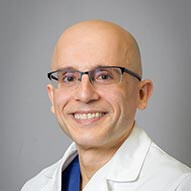Ventricular septal defect (VSD)
What is a ventricular septal defect (VSD)?

Ventricular septal defect (VSD) is a congenital (present at birth) heart condition where there is a hole in the heart’s septum (the divide between the left and right side).
As a baby develops in the womb, it is typical for there to be openings in the heart that usually close right before or just after birth. With a ventricular septal defect (VSD) a hole remains in the septum between the lower heart chambers after birth.
Ventricular septal defect (VSD) causes increased blood flow within the heart and to lungs. If the hole isn’t repaired, it can cause permanent lung damage and other health complications.
What are the different types of ventricular septal defects (VSD)?
Muscular VSD is the most common form of ventricular septal defect (VSD). The hole is in the muscular portion of the lower heart wall
Perimembranous VSD is a hole is in the lower heart wall (the membranous septum) near the valves.
Inlet VSD is the hole is in the heart wall near where the blood enters the left side through the tricuspid and mitral valves.
Conal septal VSD is the rarest form of ventricular septal defect (VSD). The hole is in the lower heart wall below the pulmonary valve.
What are the signs and symptoms of a ventricular septal defect (VSD)?
Most children with ventricular septal defect (VSD) will not experience symptoms. If symptoms do occur, they will take place during infancy (from birth to 1 year) and can vary.
Less common symptoms include:
Sweating
Poor/stunted growth
General fatigue (tiredness)
Shortness of breath, rapid breathing, congested breathing
Become easily tired while playing
Disinterest in feeding, or tiring while feeding
What are the causes of a ventricular septal defect (VSD)?
No one knows exactly why ventricular septal defect (VSD) occurs, but it is thought to be genetic or the result of environmental factors. This is the most common type of congenital heart disease, accounting for approximately 25 percent.
How is a ventricular septal defect (VSD) treated?
Ventricular septal defect (VSD) doctors and providers
 Ryan Davies, MDPediatric Cardiothoracic Surgeon
Ryan Davies, MDPediatric Cardiothoracic Surgeon Hadi Sakhai, MDPediatric Anesthesiologist
Hadi Sakhai, MDPediatric Anesthesiologist